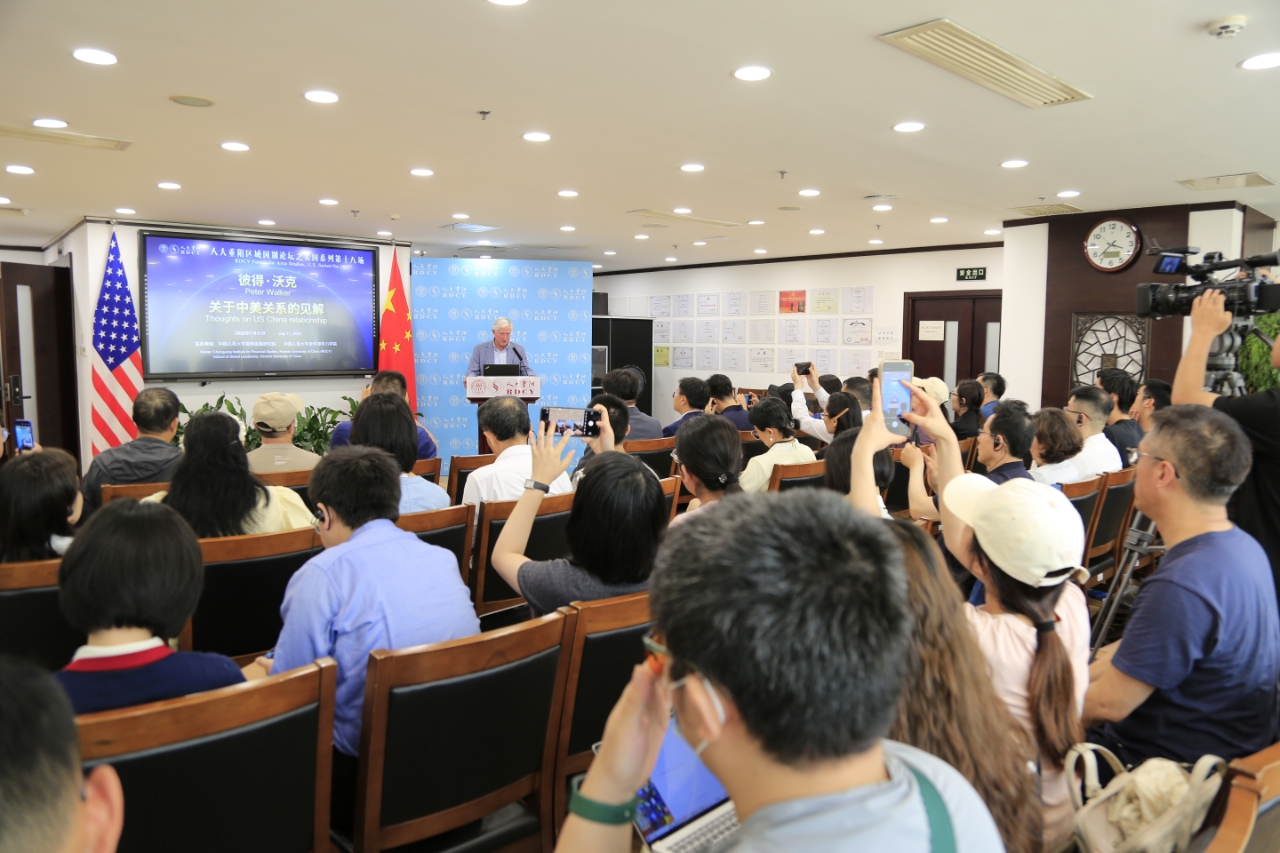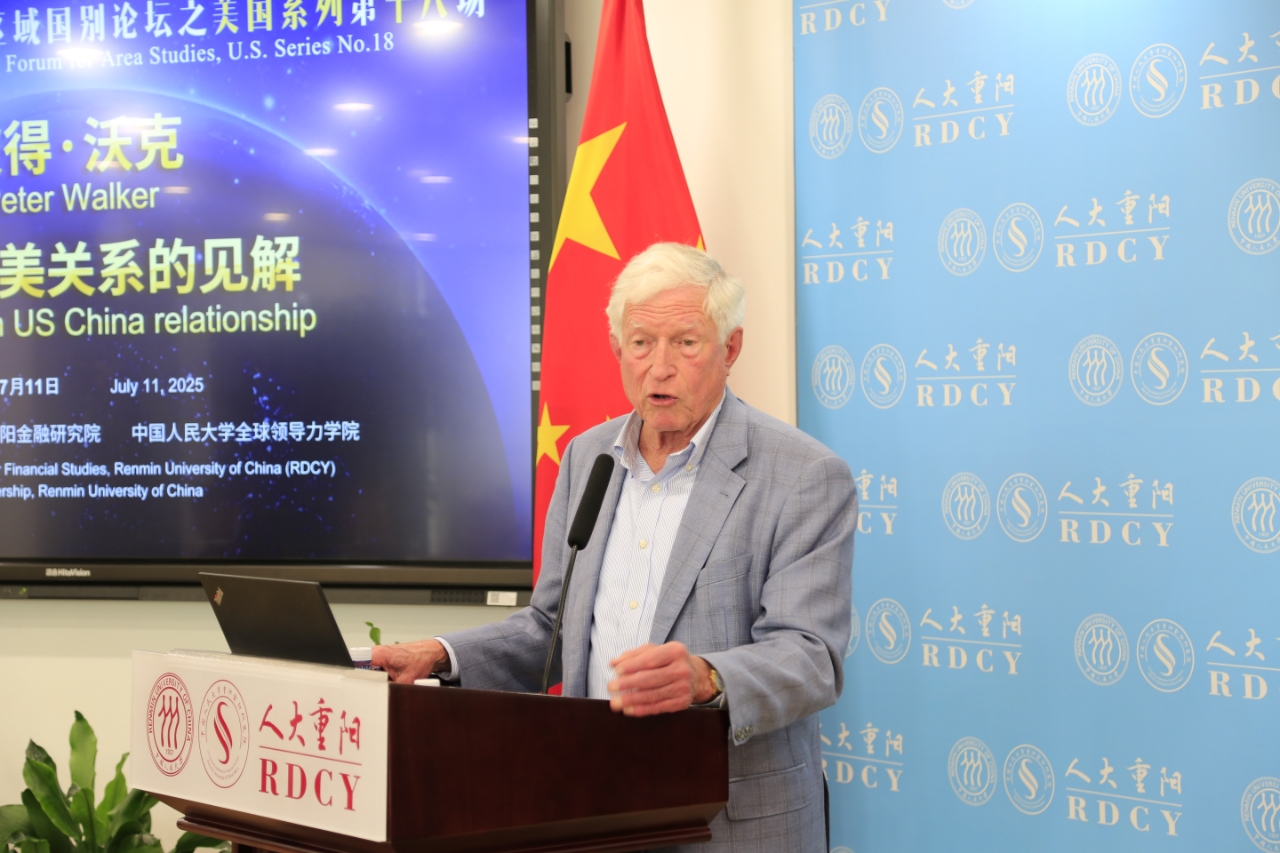EVENTS
Your Present Location: EVENTSPeter Walker Delivers Keynote Speech on U.S.-China Relations at Renmin University of China
Peter Walker Delivers Keynote Speech on U.S.-China Relations at Renmin University of China
Published Time: 2025-07-15
On July 11, 2025, Peter Walker, a renowned American scholar, visited the Chongyang Institute for Financial Studies (RDCY) at Renmin University of China (RUC). He delivered a keynote speech titled “Thoughts on U.S.-China Relations” at the RDCY Forum for Area Studies - US Series No.18. The event attracted media attention, with coverage by China Daily, China Review News Agency, Beijing Daily, 21st Century Business Herald, and others.

In his opening remarks, Wang Wen, Dean of RDCY and the School of Global Leadership at RUC, emphasized the unique nature of U.S.-China relations, noting that while tensions persist, there remains room for dialogue and cooperation. He reiterated that China has always hoped to be a friend to the United States and looks forward to a stable and constructive U.S. policy toward China.

In his keynote, Walker described the United States as undergoing a “cultural revolution,” primarily manifested in societal polarization and challenges to core democratic principles. He outlined four key aspects of this transformation:
1. Democratic Institutions Under Strain: The controversy surrounding the 2020 presidential election and the January 6 attack on the Capitol in 2021 exposed a crisis of confidence in electoral fairness and shook the foundations of the separation-of-powers system. Bipartisan conflict now centers on political wins rather than improving citizens’ livelihoods. For example, Trump’s One Big Beautiful Bill Act (OBBB) was more about political maneuvering than delivering tangible benefits to ordinary Americans.
2. Widening Societal Divides: Despite the enduring ideal of the “American Dream,” many blue-collar workers have not seen meaningful improvements in income or living standards, fueling public discontent.
3. Tariff Policies and Inflation: U.S. tariff policies have triggered ripple effects, directly increasing domestic inflation and adding to the economic burden faced by ordinary citizens.
4. Declining Global Role: The U.S. has been gradually disengaging from international institutional frameworks such as the WHO and WTO. Policies such as the OBBB tend to favor the rich and powerful, running counter to the demands of global governance.
When discussing China, Walker emphasized that Western thinking is often dominated by binary logic and a zero-sum mindset, whereas Eastern thought places greater value on balance and mutual gain. He spoke highly of China’s achievements in infrastructure and high-tech industries, particularly breakthroughs in new energy vehicles and high-speed rail. He also pointed out that the West has long misunderstood China’s rise as driven by ‘technology theft,’ when in fact China was already in a leading position in many of these fields.
While acknowledging the challenges China faces, Walker noted the country’s steady progress and capacity for rapid adaptation. He commended China’s Five-Year Plans for combining top-level design with localized flexibility, a governance model that has proven effective in poverty alleviation and infrastructure development.
Walker further noted that although the U.S. intention to contain China is clear, such efforts are unlikely to succeed. China produces six times as many STEM graduates as the U.S. every year—a talent advantage that is irreversible. Rather than slowing China down, technology restrictions are accelerating its pursuit of indigenous innovation, as demonstrated by Huawei’s breakthrough in the chip sector. He emphasized that the U.S. must accept the reality of a multipolar world and engage with China on the basis of equality.
Looking ahead, Walker expressed confidence in the potential for U.S.-China cooperation, particularly in areas such as climate change mitigation, refugee relief, and vaccine distribution.























































































 京公网安备 11010802037854号
京公网安备 11010802037854号





